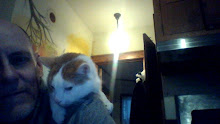Review: I IS TO VORTICISM by Ben Mirov (New Michigan Press, 2010)
The poems of Ben Mirov come at you from odd angles. They seem about to tell you something – eat a hamburger, learn to juggle, go to the movies – but surprise you instead. One feeling is ‘[a]nger at the cucumber’ and ‘beer is also a feeling.’ Literary and artistic allusions abound – Max Jacob, Robert Walser, James Tate, Moondog, Tu Fu, Haruki Murakami – yet these poems aren’t freighted like you might expect. They’re light, they move quickly, short efficient lines, spare images in simple language that ask the reader to leap from one line to the next. Though Mirov nowhere mentions him, Tomaz Salamun -- the Slovenian poet who will one year in the near future receive the Nobel Prize -- is a looming influence. Just as Salamun proceeds recklessly through a poem, so too Mirov. In an age when workshops distribute their polished fakery everywhere there is something incontestably courageous in writing a poem that aspires to be nothing less than a sincere and final dishevelment. “No feeling is also a feeling,/a powerful one surrounded by all feelings.” The poem concludes with a wonderful fragment that ‘[f]lows together at 4:17 in the afternoon.’ This seems an allusion to that other wonderful poem about Time’s passing: Frank O’Hara’s ‘The Day Lady Died’. Whereas O’Hara chooses to move his banal catalog of time-ridden duties to that moment where the narrator experiences a grief-filled alertness – and experiences being thrown out of time -- Mirov uses a catalog of timeless instances – narcotic, artistic, poetic, sensual – to remind us suddenly that this flowing outside of Time is nevertheless surrounded by Time: all things flowing together at a specific time in the afternoon. I wish I had Mirov’s facility for producing poems with such grand aristocratic ease – at least this is the way his poems appear to me. I wish I had his material disregard for what a poem should be or sound like. And I wish I had his ability to leap from line to line, to segregate revelation and issue the results sequentially in a way that yet makes a sense. Of his parents Mirov writes: ‘They are so dear to me/like two wolves who raised me/to be nothing like them.’ [6] A group of people playing ultimate Frisbee gives each other high-fives and this is an occasion to wonder about high-fives, what they mean and what happens to them as the occasion for their display recedes: ‘The high-fives continue well into the night, at the bar, thought the intensity of the exchange grows less and less. For some of us the high-fives continue even longer, as we lie alone in bed.’ [23] Loneliness kept at bay is what high-fives are really about. The image is poignant, innocent. It suggests. The prose poem ‘Cloud of Unknowing’ is a collage piece based upon an English textbook for Nepalese students: ‘How many years did the house stand after it was built? […] Did the various automatic machines in the house realize that there was no one home in the house that day? What do you think caused the sickness and death of the dog? What happened to its dead body?’ [20] The original writer was some kind of genius that Mirov discovered and worked on as Lish worked on Carver. And the odd title? It’s given an explanation, of sorts. This collection comes highly recommended.
Labels: Ben Mirov, I IS TO VORTICISM, Mirov [Ben], Review



<< Home